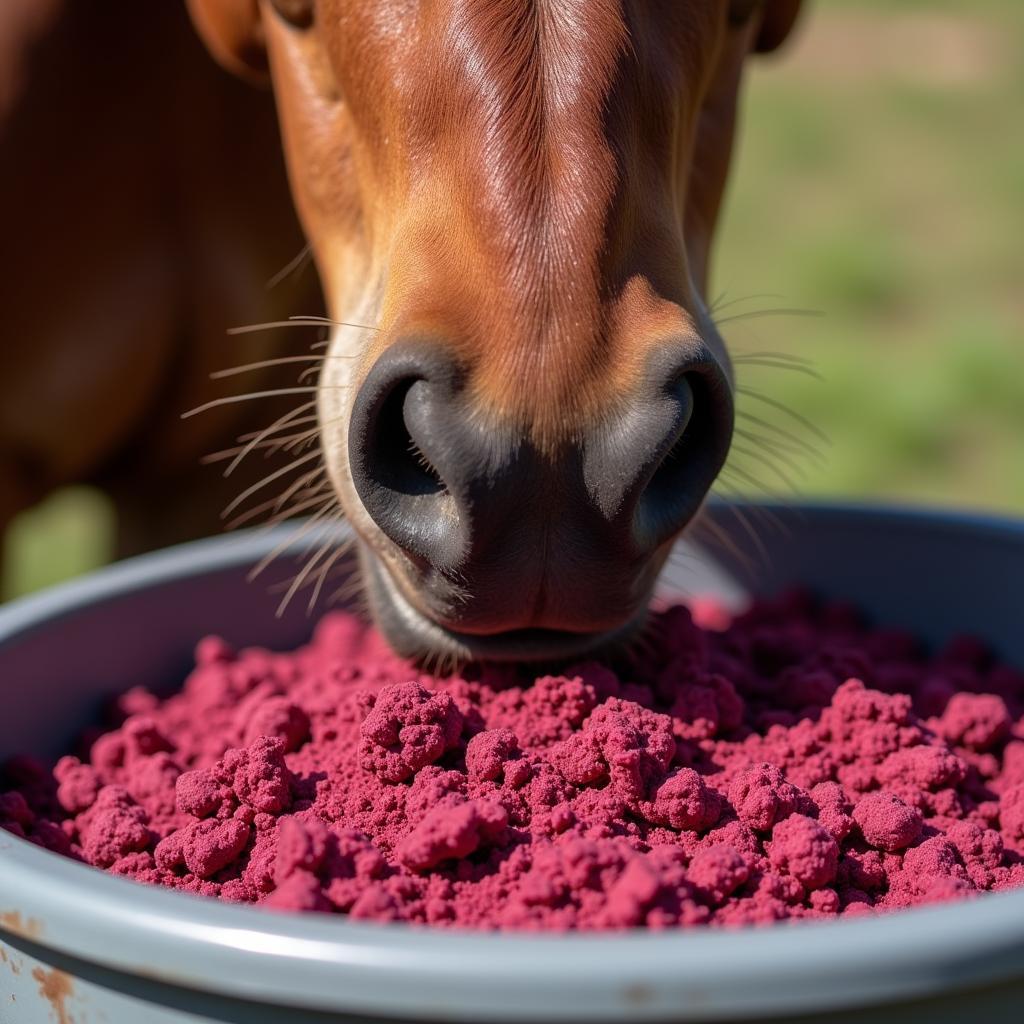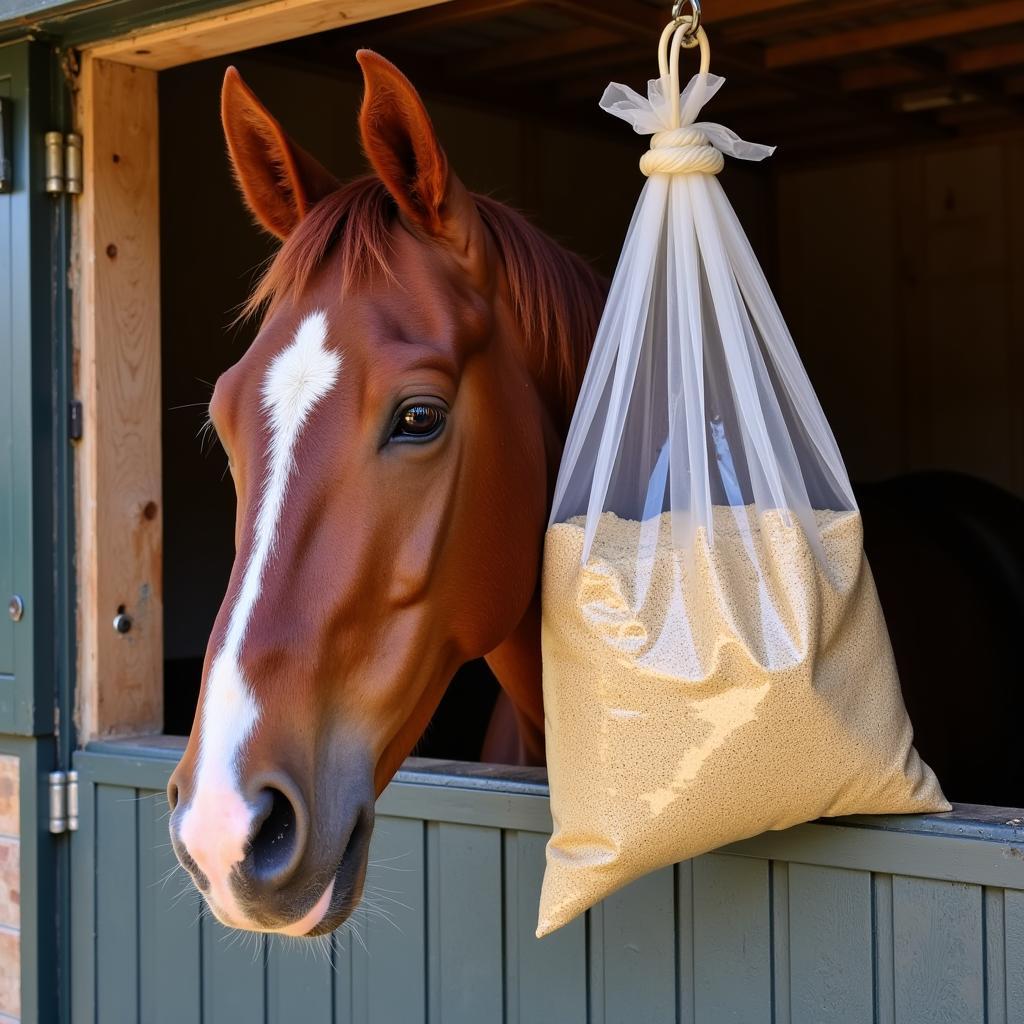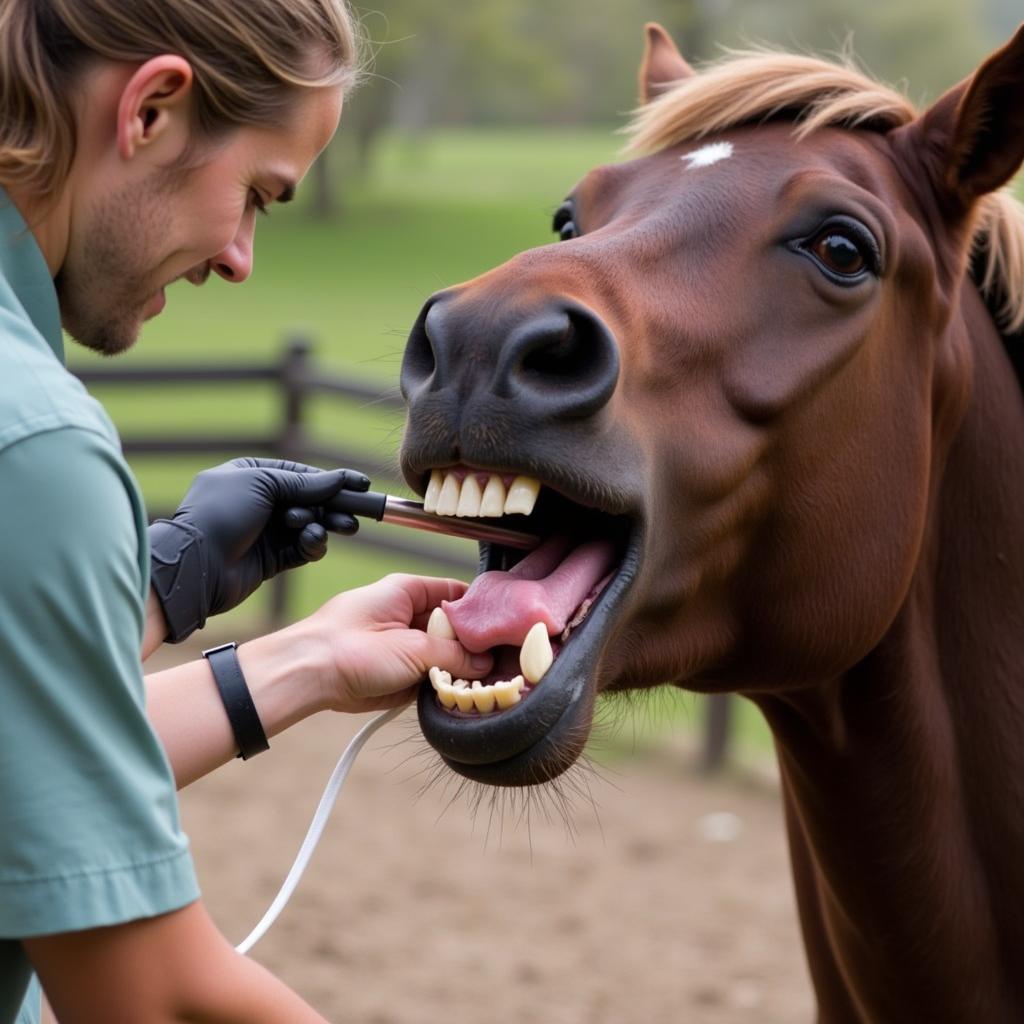Does Beet Pulp Make Horses Hot? This is a common question among horse owners, and the answer isn’t a simple yes or no. While beet pulp itself doesn’t inherently “heat” a horse in the same way that high-starch grains can, there are nuances to consider. Understanding its nutritional profile and how it’s processed is key to determining its suitability for your horse.
Understanding Beet Pulp and Its Effects on Horses
Beet pulp is a byproduct of sugar beet processing. After the sugar is extracted, the remaining pulp is dried and processed into various forms, including pellets, shreds, and meal. It’s a highly digestible fiber source, offering several benefits for horses, particularly those requiring extra calories or with dental issues. However, its energy content and how it’s utilized in the horse’s digestive system are important factors to consider when evaluating its potential to affect your horse’s behavior.
One of the main benefits of beet pulp is its high fiber content. Fiber is essential for maintaining a healthy digestive system in horses. It provides a slow-release energy source, unlike quick-burning starches that can lead to excitability. Beet pulp is also relatively low in sugar and starch, making it a suitable feed option for horses prone to metabolic issues. For horses needing to gain weight, beet pulp can be a valuable addition to their diet, alongside a weight super gain for horses.
 Horse Eating Beet Pulp Feed
Horse Eating Beet Pulp Feed
Does Beet Pulp Cause Excitability in Horses?
Beet pulp itself is unlikely to cause excitability. The “hotness” often attributed to beet pulp might be due to other factors, such as improper feeding practices or underlying metabolic conditions. Overfeeding any energy source, even fiber, can contribute to excess energy, potentially manifesting as increased activity levels. Additionally, some horses may be more sensitive to changes in their diet, regardless of the feed itself.
Factors Influencing a Horse’s Reaction to Beet Pulp
Several factors can influence how a horse reacts to beet pulp:
- Individual Metabolism: Just like people, horses have unique metabolisms. Some horses are naturally more energetic, while others are more laid-back.
- Overall Diet: The entire diet plays a role. A balanced diet with appropriate levels of protein, vitamins, and minerals is crucial for optimal health and behavior. Adding a horse mash recipe to the diet can also be beneficial.
- Feeding Management: Feeding small, frequent meals rather than large, infrequent ones can help regulate energy levels.
- Underlying Health Conditions: Certain medical conditions can influence a horse’s behavior, mimicking the appearance of “hotness.”
 Horse Eating Beet Pulp from a Feed Bag
Horse Eating Beet Pulp from a Feed Bag
Feeding Beet Pulp Correctly
When incorporating beet pulp into your horse’s diet, it’s important to introduce it gradually. This allows the horse’s digestive system to adapt and minimizes the risk of digestive upset. Soaking beet pulp, especially the shredded or pelleted form, before feeding is recommended. This not only softens the pulp, making it easier to chew and digest, but also helps prevent potential choking hazards.
Dispelling the Beet Pulp Myth
The idea that beet pulp makes horses “hot” is often a misconception. It’s a valuable fiber source that can provide numerous benefits. However, like any feed ingredient, it should be fed appropriately and as part of a balanced diet.
“Remember, a healthy horse starts with a healthy diet. Consult with an equine nutritionist or veterinarian to create a personalized feeding plan for your horse’s individual needs,” advises Dr. Emily Carter, Equine Nutrition Specialist.
 Veterinarian Examining Horse Teeth
Veterinarian Examining Horse Teeth
Conclusion: Beet Pulp and Horse Behavior
Does beet pulp make horses hot? Not inherently. Beet pulp provides a slow-release energy source from fiber, not the quick-burning sugars and starches found in grains that are typically associated with excitability. However, improper feeding practices or underlying health issues can contribute to behavioral changes that may be mistakenly attributed to the beet pulp itself. By understanding your horse’s individual needs and feeding beet pulp correctly, you can leverage its benefits without causing adverse effects.
FAQ
- What is beet pulp? Beet pulp is a byproduct of sugar beet processing, a highly digestible fiber source.
- Is beet pulp good for horses? Yes, beet pulp can be a valuable addition to a horse’s diet, especially for those needing extra calories or with dental issues.
- Can beet pulp make horses hot? Not inherently. The “hotness” is often attributed to other factors, like overfeeding or underlying metabolic conditions.
- How should I feed beet pulp? Introduce it gradually and soak it before feeding, especially pellets or shreds.
- Should I consult a vet before adding beet pulp to my horse’s diet? It’s always a good idea to consult with an equine nutritionist or veterinarian to create a personalized feeding plan.
- What are the benefits of beet pulp? Beet pulp is a good source of fiber, which is crucial for healthy digestion. It’s also low in sugar and starch.
- Can beet pulp help horses gain weight? Yes, beet pulp can contribute to weight gain in horses when fed as part of a balanced diet.
For further assistance, consider exploring related articles on our website about weight gain for horses and horse mash recipes.
When you need support, please contact us at Phone Number: 0772127271, Email: [email protected] Or visit us at: QGM2+WX2, Vị Trung, Vị Thuỷ, Hậu Giang, Việt Nam. We have a 24/7 customer service team.